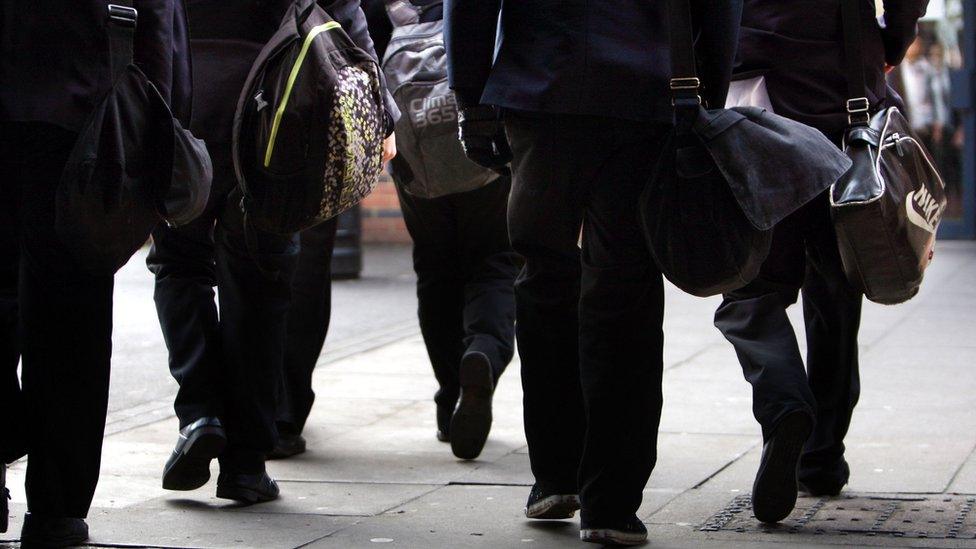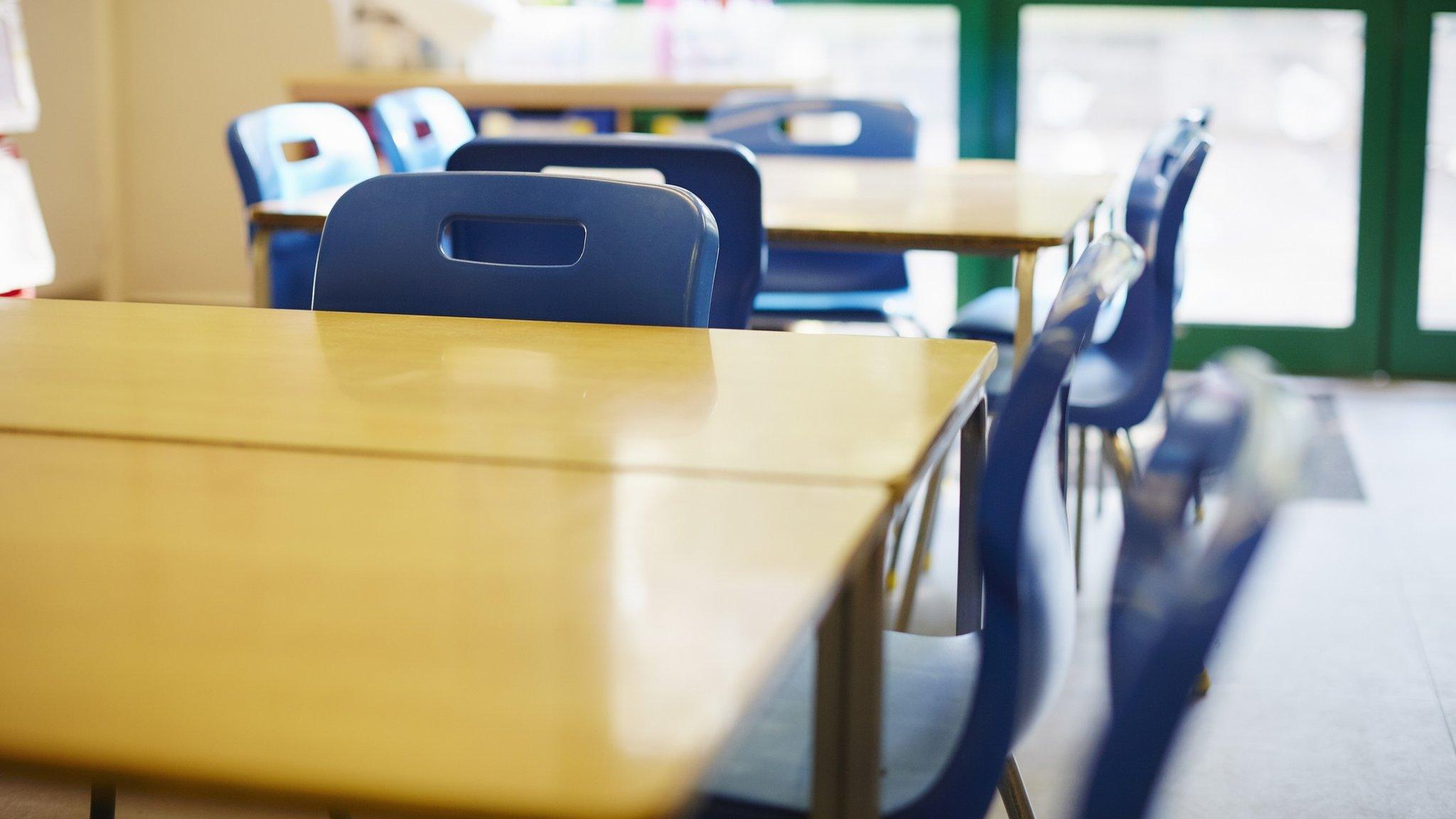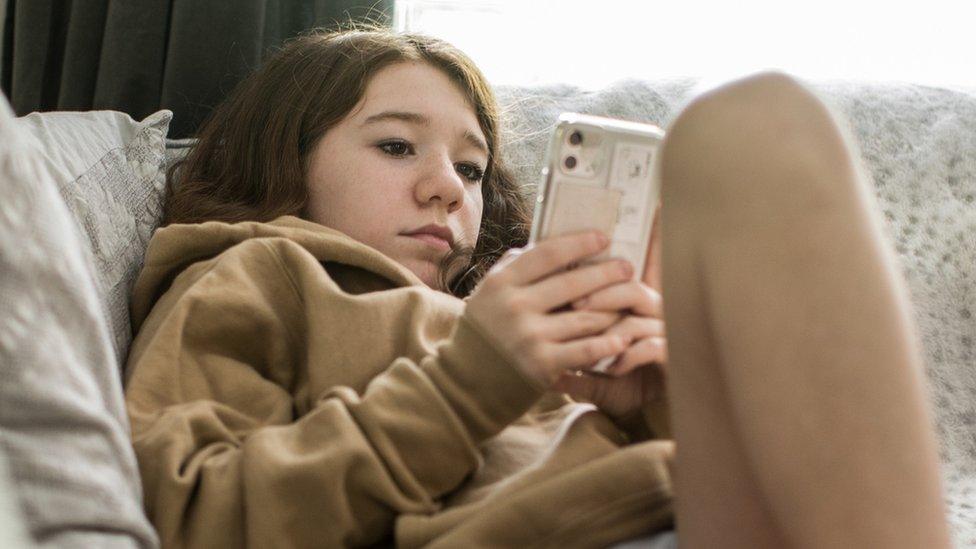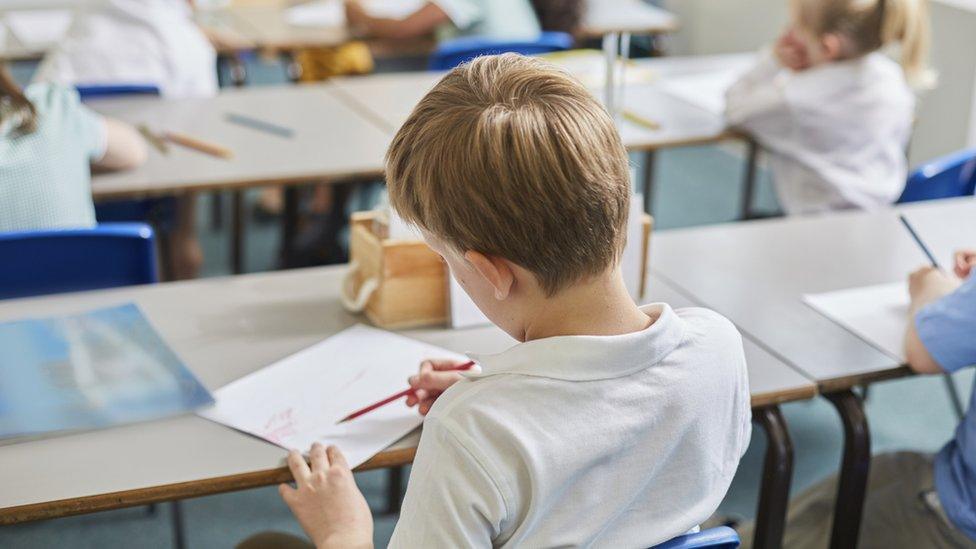School avoidance: 'I was crying, screaming and shouting in the car'
- Published

"I missed my friends but I couldn't go in."
That's how a 12-year-old girl, who BBC News NI is calling Anna, describes how it felt to miss most of the last school year because of uncontrollable anxiety.
School avoidance is when a child or young person refuses to attend school or has difficulty staying all day.
The NI Commissioner for Children and Young People has called for more support for vulnerable school-goers amid a rise in school avoidance.
Anna, who has spoken to the BBC's Evening Extra programme to raise awareness of the issue, was away from school for about six months, finding the day too long when she was feeling so stressed.
She said she had to be at home to feel better.
Anna's mother said it took many months for her to realise her daughter wasn't just being disobedient.
School avoidance is different to truancy, when a young person chooses to miss school and hides it from their parents.
According to the website The School Avoidance Alliance, external, it can affect up to about a quarter of pupils at some point in their school lives.
In Northern Ireland, there is currently no way of measuring if a pupil is absent because of school avoidance.
However, the Education Authority (EA), said the "estimate would be nationally about 1 to 2% of children who aren't attending school".

There had been a significant rise in school absences since the pandemic
Anna said she worries most about things that might happen, rather than things that have happened.
"Sitting in classes was a [very] long day. As soon as I got home there was a sense of relief. I'd do a bit of homework, eat my dinner and then as soon as dinner was over anxiety would start for the next day."
Anna's mother said things became very difficult around Halloween last year.
"I noticed her getting nervous about getting the bus. Then at night she started to cry," she said.
"The stress got worse and worse. It was affecting the whole family. I began driving her to school in December and then it got to the stage where she would not get out of the car.
"We had to get people out of the school to help. I felt like it was causing a scene," she said.
Anna added: "I started saying 'I can't go in' because it was getting too much. I couldn't go to school. I just couldn't.
"My grandparents kept saying 'go, just go".
"And I wanted to be with my friends. I didn't want to be left out. I missed all the good stuff about school, but I didn't miss the anxiety it was causing me."
'It feels like I can't trust anybody'
Since engaging with professional help, Anna has been diagnosed with separation anxiety.
"My stomach hurts, my heart beats really fast. It feels like I can't trust anybody. Even my own mum. It doesn't feel like I'm going to be OK," she said.
"I need a lot of reassurance. Because in my head I'm thinking, 'what if I get stuck at school?', which would be the worst thing ever.
"I would think, 'what if mum gets stuck in traffic or the car breaks down?' What if I get stuck?'
"In that moment I really do think that mum might forget about me.
"When I was really bad, I was crying, screaming and shouting in the car. I couldn't even talk."
'No one would believe me'
Anna's mother, who has two other children, eventually had to take six months off work.
"It got to the point where I would get to work and be so upset. I would sit and cry and then she would text me all day. Then I was having to leave early to pick her up."
She said it was difficult to convince the school and the Child and Adolescent Mental Health Service of the extent of their problem.
"The frustration for me was unless we videoed Anna at home, no one would believe the way she was behaving.
"It impacted the rest of the family so much. It got to the point I had to sleep beside her. It was the only way we could get some sleep."
Normally when a child's attendance falls below 85% a school-nominated Education Welfare Officer (EWO) becomes involved.
Rise in absences
Earlier this year, it was reported there had been a significant rise in absences since the pandemic.
The 2021/22 attendance statistics in Northern Ireland show that almost 10% of school days were missed by pupils due to absence.
By comparison, the absence rates in 2018/19, 2019/20 and 2020/21 were all about 6%.
The office of the NI Commissioner for Children and Young People (NICCY) said it had raised concerns about the increase in absence rates with the Department of Education.
"More support and interventions are needed to support our children and young people," said NICCY chief executive Mairead McCafferty.
"Ongoing cuts to services for young people are going to make things much worse particularly for our most vulnerable children.
"Those responsible, across all departments and in the political sphere, must prioritise action and resourcing to address this extremely concerning situation."
Elaine Craig, from the EA, said it had multiple services that are "well placed to support our schools and our children and young people to resolve key issues and work towards increasing school attendance".
"Do we get it right 100% of the time? I would be the first to say 'no' but I hope that we do the majority of the time. Do we need more resource? Again, I would never argue that we don't need more resource for vulnerable children and young people."
She added: "I think that when our attendance figures are at 90% and we are the lowest [school attendance] in the UK, I think that suggests that we have a lot of work to do."

If you, or someone you know, have been affected by any of the issues or topics covered in this story, you can visit BBC Action Line to find information and organisations that can help.

Related topics
- Published27 January 2023

- Published28 April 2023

- Published10 February 2022
